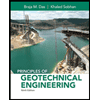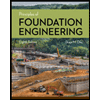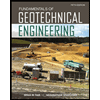A sample of dry sand in relatively loose condi- tion is subject to a triaxial test. The sample fails when the confining stress (minor principal stress) is 50 kPa and the axial stress (major prin- cipal stress) is 170 kPa. What is the angle of internal friction for the soil
A sample of dry sand in relatively loose condi- tion is subject to a triaxial test. The sample fails when the confining stress (minor principal stress) is 50 kPa and the axial stress (major prin- cipal stress) is 170 kPa. What is the angle of internal friction for the soil
Principles of Geotechnical Engineering (MindTap Course List)
9th Edition
ISBN:9781305970939
Author:Braja M. Das, Khaled Sobhan
Publisher:Braja M. Das, Khaled Sobhan
Chapter12: Shear Strength Of Soil
Section: Chapter Questions
Problem 12.18P
Related questions
Question
A sample of dry sand in relatively loose condi-
tion is subject to a triaxial test. The sample fails
when the confining stress (minor principal
stress) is 50 kPa and the axial stress (major prin-
cipal stress) is 170 kPa. What is the angle of
internal friction for the soil?
Expert Solution
This question has been solved!
Explore an expertly crafted, step-by-step solution for a thorough understanding of key concepts.
Step by step
Solved in 2 steps

Knowledge Booster
Learn more about
Need a deep-dive on the concept behind this application? Look no further. Learn more about this topic, civil-engineering and related others by exploring similar questions and additional content below.Recommended textbooks for you

Principles of Geotechnical Engineering (MindTap C…
Civil Engineering
ISBN:
9781305970939
Author:
Braja M. Das, Khaled Sobhan
Publisher:
Cengage Learning

Principles of Foundation Engineering (MindTap Cou…
Civil Engineering
ISBN:
9781305081550
Author:
Braja M. Das
Publisher:
Cengage Learning

Fundamentals of Geotechnical Engineering (MindTap…
Civil Engineering
ISBN:
9781305635180
Author:
Braja M. Das, Nagaratnam Sivakugan
Publisher:
Cengage Learning

Principles of Geotechnical Engineering (MindTap C…
Civil Engineering
ISBN:
9781305970939
Author:
Braja M. Das, Khaled Sobhan
Publisher:
Cengage Learning

Principles of Foundation Engineering (MindTap Cou…
Civil Engineering
ISBN:
9781305081550
Author:
Braja M. Das
Publisher:
Cengage Learning

Fundamentals of Geotechnical Engineering (MindTap…
Civil Engineering
ISBN:
9781305635180
Author:
Braja M. Das, Nagaratnam Sivakugan
Publisher:
Cengage Learning

Principles of Foundation Engineering (MindTap Cou…
Civil Engineering
ISBN:
9781337705028
Author:
Braja M. Das, Nagaratnam Sivakugan
Publisher:
Cengage Learning